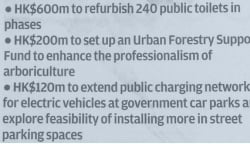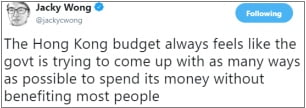This guy is so lucky we still don’t have an Article 23 national security law to make it a crime to reveal state secrets…
Even by mentioning the Hong Kong Budget you run the risk of taking it seriously. To criticize it with a straight face, as the whole spectrum of politicians, media and commentators must, is to play along with what is a farcical annual ritual. (We won’t even talk about glowing praise/analysis – pass the barf bag.)
Our bureaucrat-leaders regard government as a wealth-extracting enterprise that exists separately from – or in competition with – the economy and the populace. As always, they have a vast surplus. As always, for the sake of appearances, they scrabble around for ways to dispense some of it in relatively small amounts to a wide array of projects or causes.
The basic guideline is that for every dollar redistributed to the poor, another must be handed to the rich, and at least five more to official bodies and projects from which the cash will ooze into public works and lame business subsidies. Other than that, you just spatter it around, everywhere. Bowie’s cut-up technique helps – how else can you leap from ‘HK$600mn for public toilets’ to ‘50% tax cut for marine insurance’ to the semi-surreal ‘urban forestry’?
A dollop more or less by accident hits public hospitals, while another billion splats into the BUD Fund. (Whaddya mean ‘huh?’ That’s the Dedicated Fund on Branding, Upgrading and Domestic Sales*. No, I’ve never heard of it either. No idea what it does, but I can guarantee no-one is measuring the costs-vs-benefits, the opportunity costs, the results, the outputs, or ‘deliverables’ in any form.)
We’re sorry we couldn’t come up with anything more inane this year, but this is the best we could manage…
 * It really exists. By ‘Domestic’, it seems we mean ‘Mainland’, obviously.
* It really exists. By ‘Domestic’, it seems we mean ‘Mainland’, obviously.


It’s not as bad as some years. The usual vacuous array of hubs, throwing more money down the Cyberport drain, attracting more tourists we don’t want, etc. But presumably by accident, some of the proposals will actually benefit the public and a few even show a glimmer of long term vision, something the HK government rarely displays: expanded public harbourfront access, improved public toilets, better urban tree management (not semi-surreal, it just means keeping trees growing in the streets without them dropping branches and killing people), more money for hospitals and elderly care, expanded colorectal cancer screening (not glamorous but potentially life-saving), more help for the disabled – all these are welcome policies.